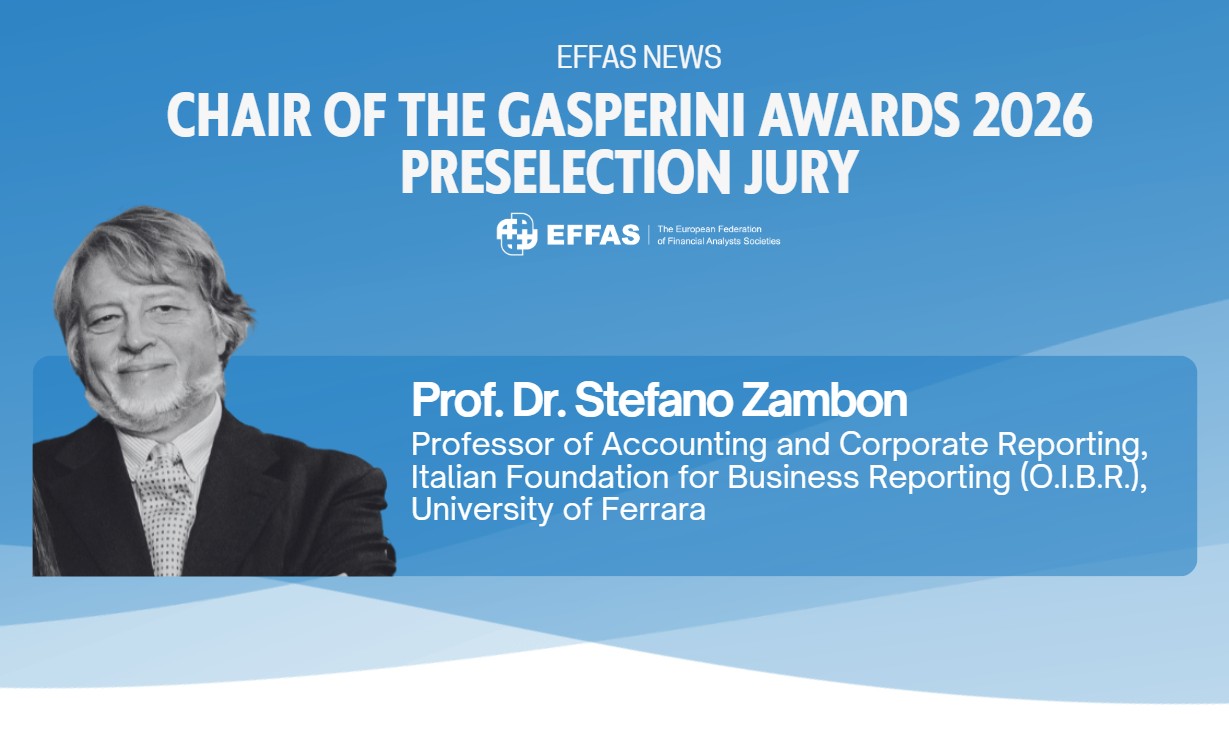The first Certified ESG Analyst (CESGA) diploma in Romania
Frankfurt am Main, 22 September 2021
Romania joins the more than 60 countries where there are holders of the Certified ESG Analyst (CESGA) diploma. This is through the partnership that the Romanian Association of Banking Financial Analysts (AAFBR) has with the European Federation of Financial Analysts (EFFAS).
CESGA certification is of great interest due to the need to integrate environmental, social and governance (ESG) requirements into international financial practice.
In Romania, the first holder of the CESGA certification is Cosmin Păunescu, who has over 20 years’ experience on the capital market. This is mostly from within the Financial Supervisory Authority (FSA), participating in negotiation and implementation groups, legislation at European and national level, as well as on numerous projects in the field of supervision.
With the support of the Bucharest Stock Exchange (BVB), the diploma will be presented to Cosmin at Bucharest Stock Exchange headquarters at the opening of the trading session on 24 September 2021 at 10am.
Special guests: Adrian Tanase – CEO of the Bucharest Stock Exchange and Prof. Dr. Alexander Bassen, Director of the CESGA programme & Professor of capital markets and management at the University of Hamburg and Member of the EFRAG project task force on EU sustainability reporting standards.
The event can be watched live on the following BVB channels:
https://www.linkedin.com/company/bucharest-stock-exchange/
https://www.facebook.com/pages/Bucharest%20Stock%20Exchange/129071300467614/
international standards on topics of real interest in the financial field.
We saw in Cosmin the enthusiasm and curiosity to accumulate relevant information on ESG criteria through this certification. In fact, there are more and more experts in Romania who want to align themselves with international training standards in ESG, given that we are facing challenges of great significance for the whole of society.”
Dr Jesus Lopez Zaballos, President of EFFAS

“EFFAS welcomes AABFR’s joint efforts to promote ESG financial education as part of the solution to the potential financial and social consequences of climate change facing the world.
Companies, investors and policy makers are becoming increasingly aware that ESG issues play a key role in the success of sustainable development, the expansion of economic growth, and the improvement of corporate performance. This highlights the need to continue training specialists in this area and our CESGA programme continues to be at the forefront.
With roots in the EFFAS Commission of ESG since 2014 the CESGA programme is the standard setter with a presence in over 60 countries around the world and a network of over 2,000 holders. Our most sincere congratulations go to AABFR’s first CESGA holder Mr. Cosmin Florin Păunescu. We are sure that this is only the beginning of the new Romanian chapter of Certified ESG Analysts striving to make this a better and greener world.”

Daniela Ropotă, CIIA, President of AAFBR
“We are glad that, through our partnership with EFFAS, we can facilitate access to education to international standards on topics of real interest in the financial field.
We saw in Cosmin the enthusiasm and curiosity to accumulate relevant information on ESG criteria through this certification. In fact, there are more and more experts in Romania who want to align themselves with international training standards in ESG, given that we are facing challenges of great significance for the whole of society.”

“The study for CESGA involves approaching a well-structured material, which allows you a very good understanding of environmental, social and governance (ESG) factors, which have already begun to reshape the world of investment.
I believe that CESGA certification is extremely useful to all those involved in the financial sector, whether we are talking about those in the field of regulation and supervision, as in my case, or practitioners in investment management, or corporate finance in general. Increasingly complex European regulations, changing investor preferences and the need to obtain favourable market conditions are just a few of the reasons to recommend it.”






